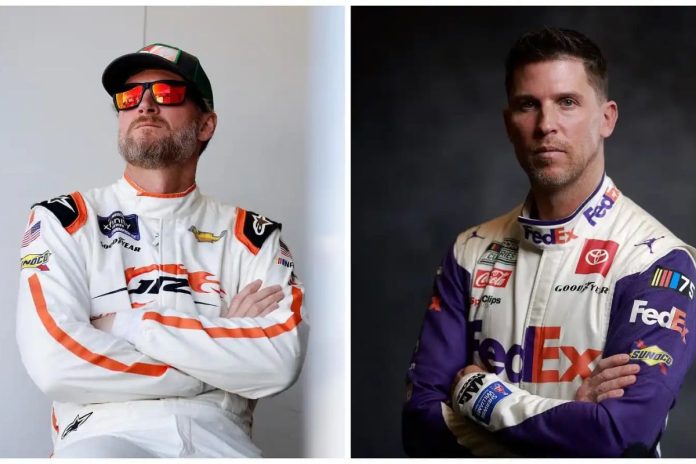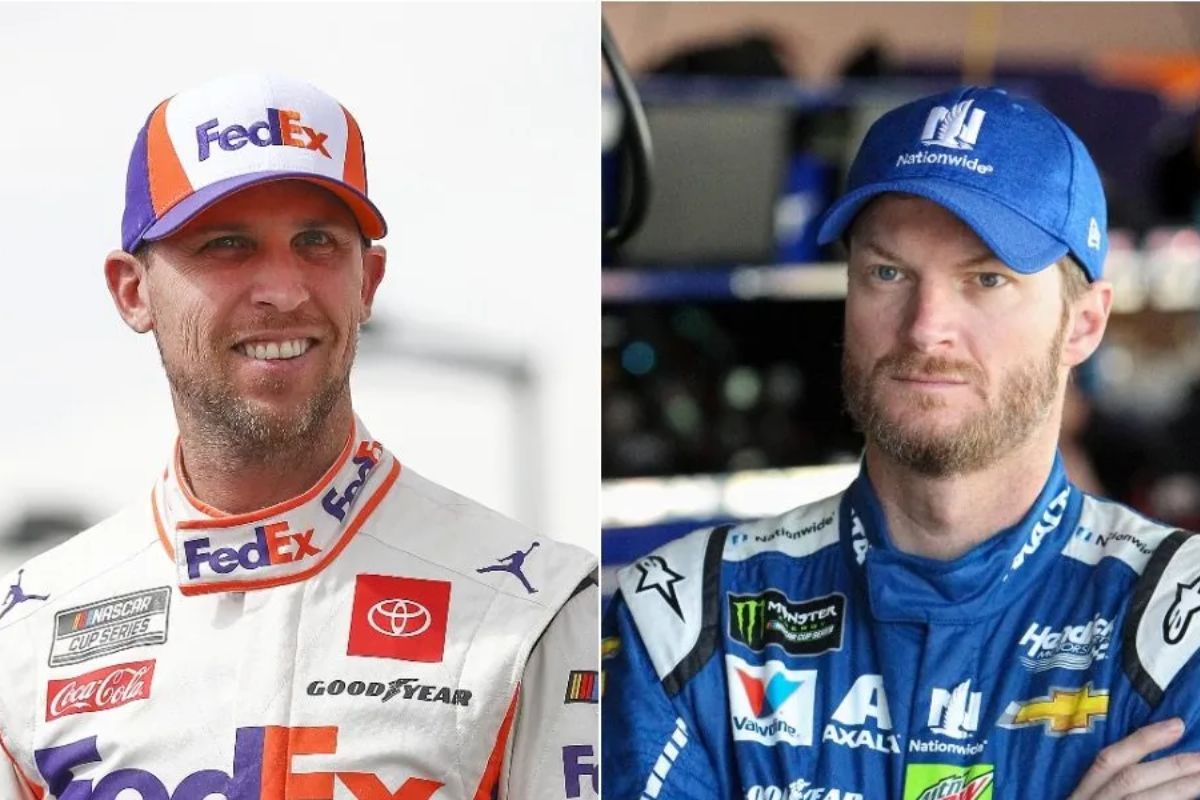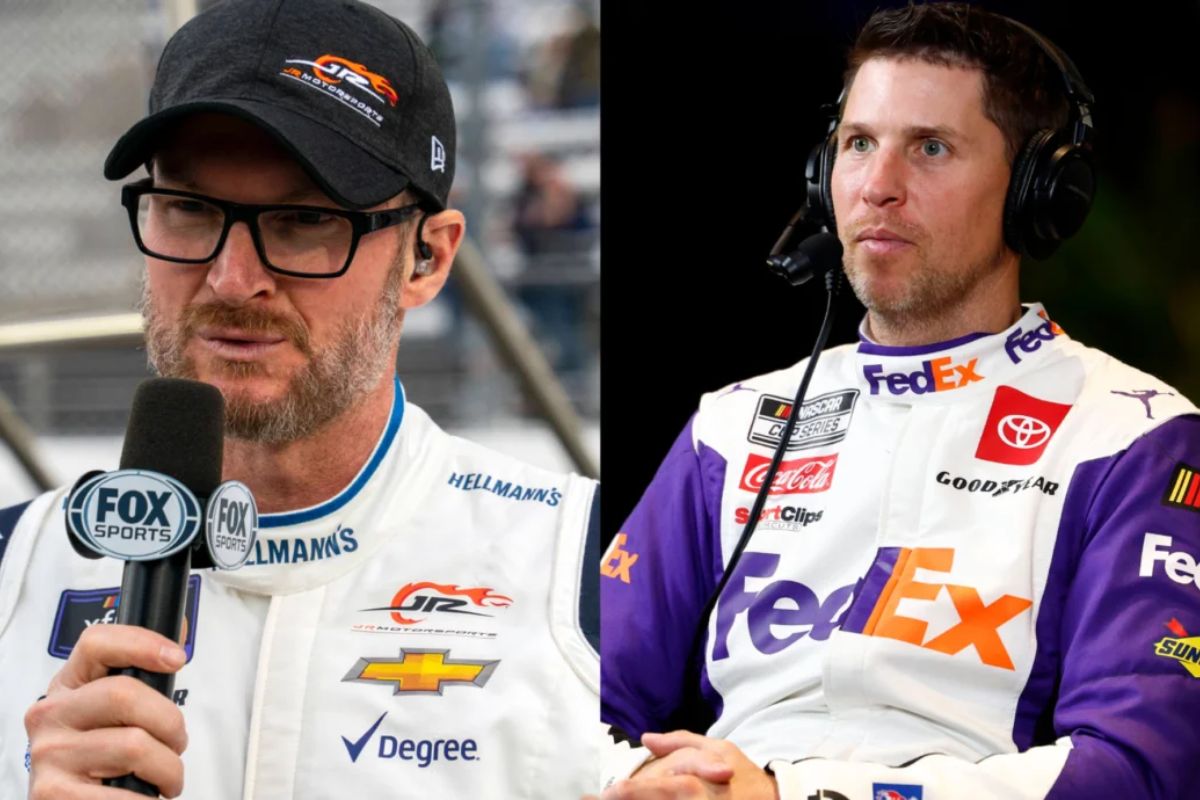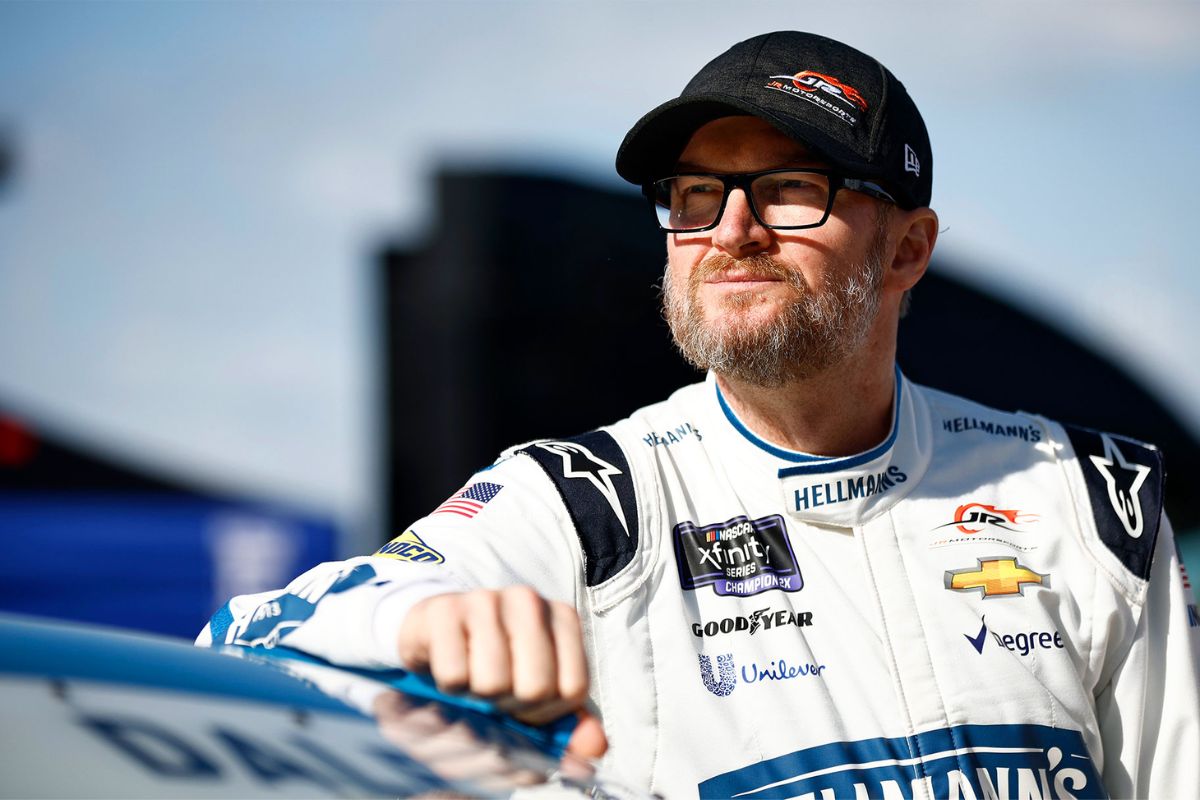Dale Jr. Concerned Over Hamlin’s Move: Dale Earnhardt Jr. expresses apprehensions over Denny Hamlin’s controversial acceleration tactic, spotlighting potential inconsistencies in NASCAR’s rule enforcement. The lack of punitive measures despite Elton Sawyer’s acknowledgment of Hamlin’s premature action highlights the rulebook’s ambiguity, raising critical questions about fairness and competition integrity. This instance exemplifies the thin line between strategic brilliance and exploitation of rules, which challenges NASCAR’s capacity to balance the encouragement of innovation with the necessity for clear, consistent rule application. As the sport grapples with these complexities, it becomes imperative to refine regulatory frameworks to guarantee equitable competition without stifling the competitive spirit intrinsic to NASCAR’s appeal. Insights into this balancing act reveal much about the sport’s future trajectory.
Key Takeaways
- Dale Jr. expresses worry that leniency towards Hamlin’s early acceleration could lead to inconsistent rule enforcement.
- Concerns arise that ambiguity in restart rules may result in unpredictable and possibly unfair race outcomes.
- Leniency in Hamlin’s case might encourage drivers to exploit rule ambiguities, risking the sport’s competitive integrity.
- Dale Jr.’s apprehension underscores the need for NASCAR to clarify and consistently apply racing rules to avoid chaos.
- The incident with Hamlin highlights the broader challenge NASCAR faces in balancing strategic ingenuity with maintaining fair play.
NASCAR’s Decision on Hamlin’s Restart: Setting a Dangerous Precedent?
NASCAR’s leniency towards Denny Hamlin’s premature acceleration during the Richmond race restart has inadvertently set the stage for a potentially slippery slope in regulatory enforcement, raising critical questions about consistency and fairness in future competitions. The acknowledgment by NASCAR’s VP of competition, Elton Sawyer, that Hamlin had indeed ‘rolled early’ yet faced no repercussions, exposes a concerning precedent within the sport’s rule enforcement strategy.
This leniency not only highlights the inherent ambiguity in NASCAR’s rulebook but also sparks a discourse on the potential for exploitation by drivers who may now perceive the boundaries of rule enforcement as malleable. The decision, or the lack thereof, regarding Hamlin’s restart, introduces a significant challenge to the integrity of competitive fairness. A sport built on the principles of equal opportunity and strict adherence to established guidelines finds itself at a crossroads, where the consistency of rule application is called into question.
The implications of this leniency extend beyond a single race or competitor; they touch upon the core of NASCAR’s governance. A precedent that allows for subjective interpretation of rules threatens the sport’s credibility, potentially leading to a future where drivers push the envelope on rule infractions, banking on inconsistent enforcement. This scenario not only undermines the competitive spirit but also challenges the regulatory body’s authority and the respect it commands amongst competitors.
Dale Earnhardt Jr.’s Concerns: A Call for Clarity from NASCAR
Amidst the controversy surrounding Denny Hamlin’s restart, Dale Earnhardt Jr. voiced his concerns, underscoring the imperative need for NASCAR to clarify its stance on rule enforcement to uphold the integrity of the sport. Earnhardt Jr. pinpointed the ambiguity in the current framework governing restarts and rule violations, highlighting a critical vulnerability in NASCAR’s regulatory mechanism. This ambiguity, if left unaddressed, could potentially unravel the fabric of fair competition that NASCAR prides itself on.
From Earnhardt Jr.’s perspective, the essence of the issue lies in the absence of a transparent and universally understood set of guidelines that delineate what is considered fair play and what constitutes a violation. This lack of clarity not only puts drivers in a precarious position, risking unintentional infringements but also places the sanctity of the sport’s outcome in jeopardy. The potential for inconsistencies in rule enforcement could inadvertently lead to an environment where drivers and teams might exploit these grey areas to their advantage, thereby compromising the spirit of equitable competition.
Therefore, Earnhardt Jr.’s call for clarity is not merely a reaction to a singular event but a foresighted plea to safeguard the sport’s future. By advocating for a more defined and consistently applied rulebook, Earnhardt Jr. envisages a NASCAR that is both fairer and more competitive. His concerns, hence, serve as an important reminder to NASCAR’s governing body of the indispensable role that clear, concise, and fair regulations play in the preservation and growth of motorsport’s integrity and appeal.
“Maybe we don’t need to get crazy and change shit, but I think NASCAR certainly has to step in and go, well, ‘we need to clarify what’s fair and what’s not’ because I thought you had to go to the box, and NACAR is now saying, ‘eh, it’s whatever.’” ( Dale )
The Thin Line Between Fair Play and Exploitation
The decision by NASCAR not to penalize Hamlin for his restart tactic has inadvertently set a precedent that risks blurring the boundaries between strategic ingenuity and outright rule exploitation. This delicate balance is important in a sport where the competitive edge is often found in the grey areas of the rulebook. Dale Earnhardt Jr.’s concerns highlight a broader issue within the racing community: the necessity for clear, unambiguous rules that leave little room for interpretation. Without such clarity, the sport risks descending into a chaotic state where the line between fair play and exploitation becomes increasingly indistinct.
By choosing not to penalize Hamlin, NASCAR has unwittingly encouraged drivers and teams to push the limits of what is considered acceptable within the sport. This approach may lead to innovative strategies and techniques, but it also opens the door to practices that could undermine the integrity of the competition. The challenge for NASCAR going forward will be to find a balance between allowing strategic creativity and preventing exploitation of the rules.
Dale Jr.’s warning sheds light on the potential for confusion and frustration among competitors as they navigate this uncertain landscape. It highlights the importance of clear, consistent enforcement of rules to maintain the sport’s competitive integrity. Without intervention, NASCAR risks fostering an environment where the pursuit of victory is marred by ambiguity and contention, rather than skill and strategy. The thin line between fair play and exploitation has never been more delicate, demanding a thoughtful response from NASCAR to safeguard the sport’s future.
“There’s no doubt he rolled early, ( Elton )
Denny Hamlin’s Defense: Exploiting the System or Playing Smart?
In light of Dale Earnhardt Jr.’s concerns regarding the fine line between strategic ingenuity and rule exploitation, Denny Hamlin’s defense casts a new perspective on the debate, asserting that adapting to the evolving dynamics of racing requires a keen understanding and utilization of NASCAR’s rulebook to one’s advantage. Hamlin’s standpoint brings to the forefront the intricate balance drivers navigate between pushing the boundaries of regulations and outright transgressing them. His commentary sheds light on an essential aspect of competitive motorsports—strategic adaptability.
Hamlin’s assertion that drivers have become adept at leveraging NASCAR’s rules to gain an upper hand highlights a broader reality in competitive environments. The ability to interpret and exploit the rulebook’s ambiguity without crossing into an unfair advantage is a skill that differentiates the astute from the merely competent. His defense points towards a sophisticated understanding of the sport’s regulatory framework, suggesting that mastery over the legal intricacies of racing can be as critical to success as the physical act of driving.
This approach to competition invites a delicate analysis of the nature of ingenuity within NASCAR. It implies that innovation is not confined to mechanical or technological advancements but extends into the cognitive domain, where strategic foresight and legal acumen play a central role. Hamlin’s perspective encourages a reevaluation of what it means to play smart in a constantly evolving sport, advocating for a paradigm where intellectual agility and regulatory savvy are as valued as speed and precision on the track.
Balancing Act: NASCAR’s Role in Maintaining Fair Competition
Facing the intricate challenge of guaranteeing equitable competition, NASCAR must carefully balance rule enforcement with the dynamic strategies employed by drivers such as Hamlin, who adeptly navigate the gray areas of the sport’s regulations. This balancing act is not merely a question of applying existing rules but also involves a continuous process of evaluating whether the regulations themselves need adaptation to preserve the integrity of the competition. As drivers innovate within the confines of the rulebook, NASCAR finds itself in a perpetual state of reassessment, aiming to maintain a level playing field while fostering the competitive spirit that defines the sport.
The task at hand for NASCAR is complex. On one side, there’s the need to uphold the rules to ensure fair play. However, on the flip side, NASCAR must acknowledge and respect the ingenuity and tactical acumen of drivers like Hamlin who, within the bounds of legality, push the envelope to gain a competitive edge.
Consistency in enforcement emerges as a critical factor in this equation. Inconsistencies or perceived favoritism in how penalties are applied can lead to unrest among drivers and teams, potentially undermining the sport’s credibility. NASCAR’s role extends beyond mere rule enforcement to being an arbiter of fairness, tasked with making decisions that reflect an in-depth understanding of both the letter and the spirit of the regulations.
News in Brief
The debate surrounding Hamlin’s restart tactic and the subsequent response from NASCAR highlights a crucial moment in the sport’s regulatory environment. Dale Earnhardt Jr.’s concerns shed light on the need for clearer guidelines to prevent the blending of ethical lines in competitive practices.
This incident exemplifies the delicate balance NASCAR must maintain between fostering spirited competition and ensuring fair play. Ultimately, the resolution of such dilemmas will shape the integrity and future trajectory of stock car racing.
Our Reader’s Queries
Q. Does Dale Jr still own a NASCAR team?
A. JR Motorsports, helmed by Dale Earnhardt Jr., stands as the premier professional race team in the NASCAR circuit.
Q. Is Dale Jr a NASCAR champion?
A. Dale Earnhardt Jr., hailing from a lineage steeped in NASCAR glory, represents the third generation of champions in a family synonymous with the sport. Widely regarded as one of the most beloved figures in NASCAR’s storied history, Earnhardt Jr. holds a special place in the hearts of fans across the globe.
Q. Did Dale Jr ever win a Daytona 500?
A. Earnhardt’s triumph at Martinsville Speedway in 2014 remains a memorable highlight in his illustrious career. Yet, among his impressive tally of 26 Cup Series victories, two standout moments define his legacy: the 2004 and 2014 Daytona 500 victories. The significance of the Daytona 500 resonates deeply with Earnhardt, who bore witness to his father, the legendary Dale Earnhardt Sr., grappling with the challenges of securing the prestigious title during his illustrious career.
ALSO READ: Dale Jr.’s Hellmann’s Bristol Paint Scheme Revealed: See It Now!





